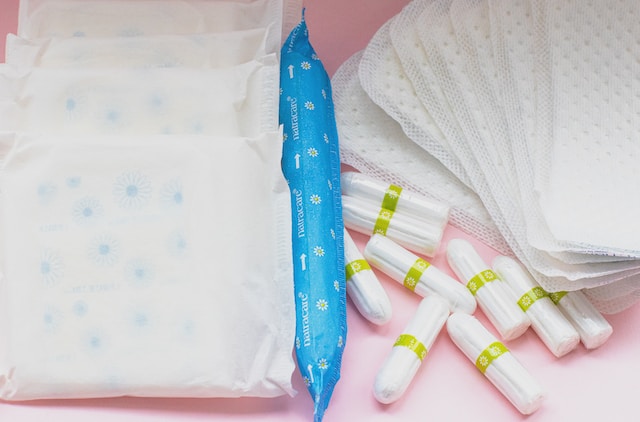Menstruation is a natural process that most women experience, and it can come with its share of discomfort and uncertainties. Being aware of the signs that your period is coming tomorrow and the symptoms that indicate its approach is crucial for effective management.

Understanding the menstrual cycle and paying attention to the cues that our bodies give us can help us prepare better. In this article, we will explore the importance of understanding the menstrual cycle, the signs, and symptoms that periods are coming soon.
So, let’s delve into this topic and gain a deeper understanding of our bodies and how to navigate the monthly menstrual cycle with self-care and awareness.
Understanding the Menstrual Cycle
The menstrual cycle is a complex and natural process that occurs in the female reproductive system. It involves a series of hormonal changes and physical events that prepare the body for potential pregnancy. Let’s take a closer look at the key aspects of the menstrual cycle, including its brief explanation, typical length, and hormonal changes.
A. Brief Explanation of the Menstrual Cycle
The menstrual cycle refers to the regular series of physiological changes that occur in a woman’s reproductive system on a monthly basis. It typically starts from the first day of menstruation, which is the shedding of the uterine lining, and continues until the next period begins.

The menstrual cycle is governed by various hormones, including estrogen and progesterone, which fluctuate throughout the cycle and play a crucial role in regulating the process.
B. Typical Length of the Menstrual Cycle
The menstrual cycle length varies from woman to woman, but on average, it lasts around 28 days. However, it’s important to note that menstrual cycles can range from 21 to 35 days and still be considered normal. The menstrual cycle length is typically calculated from the first day of one period to the first day of the next period.
C. Hormonal Changes During the Menstrual Cycle
The menstrual cycle is marked by hormonal changes in a cyclic pattern. These hormonal fluctuations are responsible for the various phases of the menstrual cycle, including the menstrual phase, follicular phase, ovulation, and luteal phase.

During the menstrual phase, the levels of estrogen and progesterone are low. This leads to the shedding of the uterine lining. In the follicular phase, estrogen levels start to rise, leading to the thickening of the uterine lining.
Ovulation occurs when an egg is released from the ovary, typically around the middle of the cycle. This is followed by the luteal phase, where progesterone levels increase to prepare the uterus for potential implantation.
Understanding the menstrual cycle and its hormonal changes can provide insights into the different phases of the cycle and help women anticipate and manage their menstrual symptoms effectively. Let’s move on to the next section to explore the signs that indicate your period is coming tomorrow.
signs that your period is coming tomorrow
It’s important to note that every woman’s experience with premenstrual symptoms may vary. However, we are giving 13 common physical signs that indicate your periods are coming soon.
1. Abdominal Cramps
Abdominal cramps are one of the common signs your period is coming soon. Many menstruate individuals experience abdominal cramps, or dysmenorrhea, as a premenstrual symptom.
These cramps are usually felt in the lower abdomen, ranging from mild discomfort to severe pain. They are often described as a dull, aching sensation accompanied by bloating, back pain, and other aches.
The exact cause of abdominal cramps during menstruation is not fully understood, but it is believed to be related to the contractions of the uterus as it sheds its lining. These contractions can cause discomfort and pain and may also be influenced by hormonal changes.
There are various ways to manage abdominal cramps during menstruation, including over-the-counter pain medications, applying heat to the lower abdomen, practicing relaxation techniques, and maintaining a healthy lifestyle.
If the pain is severe or significantly impacts daily activities, it is recommended to consult a healthcare provider for further evaluation and management.
2. Breast Tenderness
Breast tenderness is a common symptom that many individuals experience as a sign that their periods are coming. It is often referred to as mastalgia or mastodynia. Breast tenderness typically occurs in the days leading up to the menstrual cycle and can persist throughout the period.

This symptom is thought to be caused by hormonal changes in the body during the menstrual cycle. Estrogen and progesterone levels fluctuate during this time, which can result in breast tissue becoming more sensitive and tender. The breast may feel swollen, heavy, or painful to touch, and the discomfort can range from mild to severe.
Breast tenderness as a menstrual symptom can vary in intensity from person to person, and it may be accompanied by other premenstrual syndromes (PMS) symptoms such as mood swings, bloating, and fatigue. Engaging in self-care measures such as wearing a supportive bra, applying a warm compress, or taking over-the-counter pain relievers may help alleviate the discomfort.
3. Bloating
Bloating is a common symptom experienced by many individuals as a sign that their period is on its way. It is characterized by a feeling of fullness or tightness in the abdominal area and can be accompanied by other symptoms such as cramping, mood swings, and fatigue.
The exact cause of bloating during the menstrual cycle is not entirely understood, but it is believed to be related to hormonal changes in the body. Fluctuations in estrogen and progesterone levels can affect the digestive system, leading to a buildup of gas and fluid in the intestines. This can cause the stomach to appear swollen and feel uncomfortable.
In addition to hormonal changes, other factors such as diet, stress, and lack of exercise can also contribute to bloating. Consuming high amounts of salt, sugar, or caffeine, for example, can worsen bloating symptoms. Drinking plenty of water, eating a balanced diet, and engaging in regular exercise can help alleviate bloating and other menstrual symptoms.
4. Mood Swings
Mood swings are a common symptom experienced by many individuals as a sign that their period is coming soon. They are characterized by sudden and intense changes in mood, such as feeling irritable, anxious, or sad.

The exact cause of mood swings during the menstrual cycle is not entirely understood, but it is believed to be related to hormonal changes in the body. Fluctuations in estrogen and progesterone levels can affect neurotransmitters in the brain, leading to changes in mood and behavior.
In addition to hormonal changes, other factors such as stress, lack of sleep, and poor diet can also contribute to mood swings. Engaging in self-care activities such as exercise, relaxation techniques, and getting enough sleep can help alleviate mood swings and other menstrual symptoms.
5. Acne Breakout
One of the most common signs that your period is coming tomorrow is acne breakout. This is caused by hormonal changes in the body that can lead to an overproduction of sebum and clogged pores.

During the menstrual cycle, estrogen levels decrease while progesterone levels increase. This hormonal shift can trigger an increase in sebum production, leading to acne breakout. Acne breakouts can appear on the face, chest, or back, and can vary in severity.
To manage acne breakout during your period, it is essential to maintain a consistent skincare routine, avoid touching or picking at the skin, and limit exposure to irritants such as harsh chemicals and sun exposure. Over-the-counter acne treatments such as benzoyl peroxide or salicylic acid may also help manage acne breakouts.
6. Fatigue
Another common sign that your period is coming soon is fatigue. This is caused by changes in hormone levels and can be exacerbated by poor sleep habits. During the menstrual cycle, progesterone levels rise, leading to feelings of tiredness and sluggishness. Additionally, changes in sleep patterns and quality due to hormonal fluctuations can contribute to fatigue.
To manage fatigue, it is important to prioritize sleep and establish a consistent sleep routine. Aim for at least 7-8 hours of sleep per night and avoid caffeine and alcohol close to bedtime. Regular exercise, a balanced diet, and stress reduction techniques such as meditation or yoga may also help manage fatigue.
7. Increased appetite or food cravings
A common sign that your period is about to start is increased appetite or food cravings. This is caused by changes in hormone levels and the body’s need for energy. During the menstrual cycle, estrogen levels fluctuate, leading to changes in appetite and food preferences. Additionally, the body’s need for energy may increase due to the physical demands of menstruation.

To handle excessive food cravings, it is essential to maintain a balanced and nutritious diet. Focus on incorporating whole, nutrient-dense foods such as fruits, vegetables, lean proteins, and complex carbohydrates. It is also important to listen to your body and honor your cravings in moderation. Regular exercise and stress reduction techniques may also be helpful in this case.
8. Headache or migraines
Headaches or migraines are common symptoms that many women experience a few days before their period. These headaches can range from mild to severe, usually caused by hormonal changes during the menstrual cycle.
The fluctuation of hormones, particularly estrogen, and progesterone, can cause changes in the brain’s chemical balance, leading to headaches or migraines. Additionally, changes in blood flow to the brain and neck muscles can trigger these headaches.
To alleviate these symptoms, over-the-counter pain relievers, such as ibuprofen or aspirin, can be used.
9. Back pain
Back pain is another common symptom of PMS and is often related to menstrual cramps. During your period, your uterus contracts to shed its lining, which can cause discomfort and pain in your lower back.
The pain can vary in intensity and can be accompanied by bloating and other symptoms. To help relieve back pain, you can place a heating pad or hot water bottle on the affected area or take a warm bath.
10. Changes in vaginal discharge
Changes in vaginal discharge can also be one of the signs that your period is coming tomorrow. This discharge may become thicker, more opaque, or more abundant as your menstrual cycle progresses.
These changes are due to fluctuations in estrogen levels, which can alter the consistency and volume of vaginal discharge. A mild odor may accompany the discharge, but it should not be strong or unpleasant. If you experience any abnormal discharge or pain, or itching, it’s essential to consult your doctor.
11. Difficulty in Sleeping
Difficulty sleeping is one of the common symptoms that periods are coming soon or experienced in the days leading up to their period. Hormonal changes, particularly increased progesterone levels, can cause insomnia or restless sleep.

Additionally, physical discomforts, such as bloating, cramps, or headaches, can also make it difficult to sleep. To improve sleep quality, it’s recommended to establish a regular sleep routine, limit caffeine and alcohol intake, and engage in relaxation techniques such as deep breathing or meditation.
12. Joint or Muscle Pain
Joint or muscle pain is another common symptom of PMS that many women experience. During the menstrual cycle, hormones such as estrogen and progesterone can affect the body’s inflammation response, leading to joint or muscle pain.

Additionally, changes in fluid retention or bloating can also contribute to these symptoms. Over-the-counter pain relievers such as ibuprofen or aspirin can help alleviate these symptoms.
13. Changes in bowel movements
Changes in bowel movements can also occur as one of the signs that your period is coming tomorrow. Fluctuations in hormones, particularly progesterone, can slow down the digestive system and lead to constipation.
Additionally, bloating and gas can also cause discomfort in the abdominal area. Drinking plenty of water, eating a fiber-rich diet, and exercising regularly can help regulate bowel movements and alleviate symptoms.
Other Factors to Consider
A. Variability of menstrual cycle length: The length of a menstrual cycle can vary from person to person. While the average cycle length is around 28 days, some women may have shorter or longer cycles. Understanding the variability of menstrual cycle length can help you better predict when your period is coming and manage any associated symptoms.

B. Individual differences in symptoms: Every woman’s menstrual experience is unique, and the symptoms they experience may vary from month to month. While some women may experience more severe cramps, others may have more bloating or mood changes. Knowing your individual symptoms can help you better manage them and seek medical advice if needed.
C. Importance of tracking menstrual cycle: Tracking your menstrual cycle can provide valuable information about your health and help you better understand your body’s natural rhythms. By noting the start and end dates of your period and any associated symptoms, you can track changes in your cycle over time and identify any irregularities or potential health concerns. This can also help you plan ahead for any upcoming events or activities that may be affected by your period.
Conclusion
As women, paying attention to your body is crucial, especially regarding your menstrual cycle. There are several symptoms that periods are coming soon, including physical, emotional, and behavioral symptoms.
Breast tenderness, bloating, cramps, headaches, fatigue, and mood swings are all common physical symptoms. Meanwhile, irritability, anxiety, and depression are common emotional symptoms. Finally, increased appetite, changes in sleep patterns, and decreased interest in sex are common behavioral symptoms.
Being mindful of your body’s signals and caring for yourself during menstruation is essential for your overall health and well-being. Don’t ignore the signs that your period is coming tomorrow; be proactive about managing any symptoms you experience. Doing so can help ensure a smoother and more comfortable menstrual cycle.
References
- Mayo Clinic. (2021, January 16). Menstrual cycle: What’s normal, what’s not. Retrieved from https://www.mayoclinic.org/healthy-lifestyle/womens-health/in-depth/menstrual-cycle/art-20047186
- Women’s Health Concern. (2022, February). Premenstrual syndrome (PMS). Retrieved from https://www.womenshealthconcern.org/premenstrual-syndrome-pms/
- American College of Obstetricians and Gynecologists. (2021, May). Premenstrual syndrome (PMS). Retrieved from https://www.acog.org/womens-health/faqs/premenstrual-syndrome-pms
Frequently Asked Questions
Is dryness before period normal?
It is normal to experience vaginal dryness before your period. This occurs because of hormonal changes in your body that lead to a decrease in estrogen levels. Vaginal dryness can cause discomfort and pain during sexual intercourse. However, there are ways to manage this symptom, such as using water-based lubricants or hormone replacement therapy.
What happens to your body a week before your period?
A week before your period, you may experience a variety of symptoms, such as mood swings, bloating, breast tenderness, and acne breakout. These symptoms occur due to hormonal changes in your body, primarily an increase in estrogen and progesterone levels. Additionally, you may experience cramping, fatigue, and food cravings.
What to do when periods are late?
If your period is late, there are several things you can do. First, take a pregnancy test to rule out pregnancy as a potential cause. If the test is negative, consider other factors that could be causing a delay, such as stress, weight changes, or changes in medication. If you continue to experience irregular periods, talk to your healthcare provider.
Why is my period late and I have white discharge?
A late period with white discharge could be a sign of several things. It could be a normal part of your menstrual cycle, or it could indicate pregnancy, hormonal imbalances, or an infection. It’s best to speak with your healthcare provider to determine the underlying cause.
How many days after white discharge does period come?
The number of days between white discharge and the start of your period can vary. Typically, the discharge is a sign that your body is preparing for your period, and it may occur a few days to a week before your period starts. However, everyone’s menstrual cycle is unique, and some may not experience this symptom.
Why do I feel like my period is coming but it doesn’t?
Feeling like your period is coming but it doesn’t can be frustrating. This symptom can be caused by several factors, including stress, changes in hormone levels, or changes in medication. If you continue to experience this symptom, speak with your healthcare provider to determine the underlying cause.
How can I make my period start?
While there is no guaranteed way to make your period start, there are a few things you can try. One is to engage in regular exercise, which can help regulate your menstrual cycle. Another is to try acupuncture, which has been shown to help induce menstruation. Additionally, some natural remedies, such as ginger and cinnamon, may help stimulate menstruation.
How late can a period be?
A period can be considered late if it is more than five days past your expected start date. However, it’s important to note that everyone’s menstrual cycle is unique, and occasional irregular periods are normal.
What time of day do periods come?
Periods can start at any time of day. However, some people may experience heavier bleeding during the morning or evening hours.
What discharge comes before period?
Before your period, you may experience a thick, white discharge. This discharge is caused by hormonal changes in your body and is a sign that your period is coming soon.
Do u get wet before period?
It’s normal to experience increased vaginal wetness before your period. Hormonal changes in your body cause this and can help prepare the vagina for menstruation.
